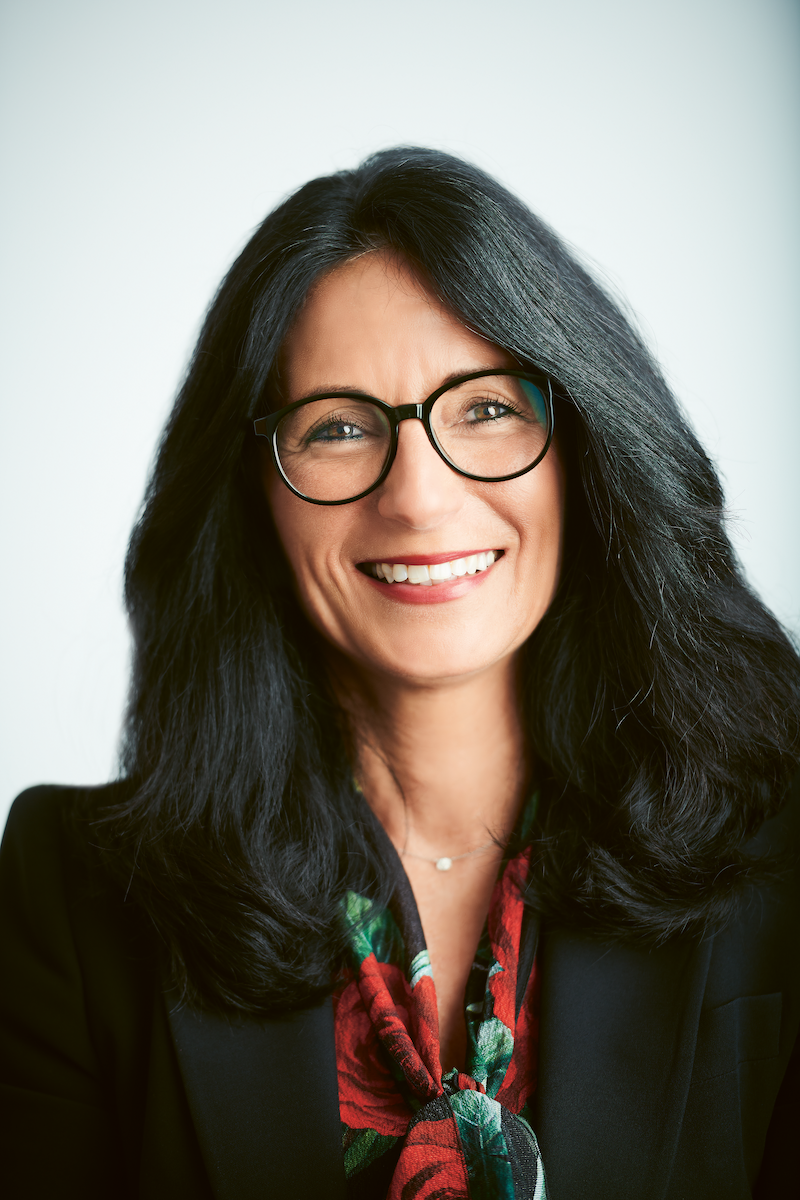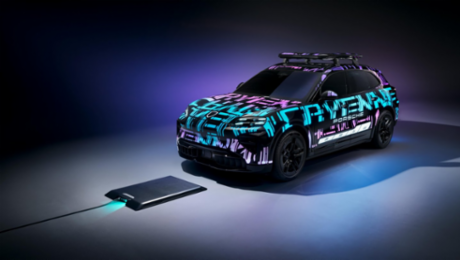The automotive industry is in the midst of the greatest transformation in its history. What does that mean for procurement?
Barbara Frenkel: Make no mistake: We in procurement are helping shape the transformation. Many of our traditional suppliers are currently changing their portfolios. We’re right with them, providing impetus for strategy and long-term planning. We also advise on financing. But that’s just one aspect. We are finding completely new suppliers, especially for electromobility. One example of this is when we equipped our all-electric Taycan sports car with the highly innovative 800-volt technology. We are also increasingly entering into partnerships and investments. Agile startups are particularly attractive to us. This is why we’re active in scouting formats such as the Startup Autobahn, and we connect with founders through our incubator Forward 31. In addition to the commercial factors, the way our components are manufactured is very important to us. Sustainability is a must! To make the supply chain transparent and to verify this, we also use artificial intelligence. Overall, our purchasers are building up a lot of expertise as the transformation proceeds.
What does electrification of the powertrain mean for procurement?
Frenkel: We have a broad foundation, working with renowned suppliers in different regions. The important thing is that our battery manufacturers can guarantee long-term access to the relevant raw materials. But we’re constantly analyzing the market.
You’ve already mentioned the role of partners. What will Porsche be doing itself in the future, and what will be handled by strategic partners or a broader network of specialists?
Frenkel: We’ll decide that within the team. I head a committee, our Strategic Value Creation Management. All key stakeholders in the company are represented there – developers, production experts, procurement specialists and colleagues from the fields of sustainability and investment management. Together, we will analyze what makes the most sense for Porsche. It’s a dynamic process. We’re taking a close look at the core competencies that we want to retain in the company in the future as well.
What role will Porsche Engineering play in that?
Frenkel: Porsche Engineering is a proven partner. And we want to work together in the future as well, for example in the development of complete functions and variants. We rely on the innovation expertise of Porsche Engineering.
Dr. Peter Schäfer: Our standard has always been to act as a strategic technology partner to our customers. So a strategic orientation of partnerships is consistent with our desire to create value over the long term and in defined areas related to capabilities and innovation. Today, the focus is on the development of the intelligent and connected vehicle. In this regard, we are focusing on a systems approach, because a function today consists of hardware plus software, with the focus increasingly shifting towards the software. We have developed a long-term strategy to further expand our capabilities in the areas of functional development and systems engineering, especially at our international tech locations. We are seeing strong growth there, particularly in new areas such as automated driving, cloud technology and big data, as well as AI.
“Our standard has always been to act as a strategic technology partner to our customers.” Dr. Peter Schäfer, CEO of Porsche Engineering
Software is a central topic in the automotive industry. How much do you do yourself in this area, and how much do you outsource?
Frenkel: Software is becoming ever more important. We are well positioned. Within the Volkswagen Group, CARIAD is pushing ahead with the major software architectures. At Porsche, however, we are currently focusing primarily on the architecture for the ‘E³ 1.2’ platform, which is set to be used in the new Macan.
Schäfer: Software is a central pillar of our development work – across all departments. For years, for example, we have been responsible for developing the battery core software for the entire group, analyzing performance at battery level in the field for Porsche with the aid of AI, developing predictive thermal management and also brand-specific functions for autonomous driving. However, development is only one side – you also have to test, integrate and put software into operation. We have also developed a strategy for this and are implementing it worldwide, for example with hardware-in-the-loop testing. And of course, we also conduct vehicle tests. In Nardò we have the ideal conditions to allow us to test future driving functions as well. Among other things, we use the combination of virtual and real testing because complex autonomous driving functions can no longer be tested exclusively in driving scenarios.
“The entire value-added network will have to be even more forward-thinking in the future. We want a supply chain that is as resilient as possible without any one-sided dependencies.” Barbara Frenkel, Member of the Executive Board for Procurement at Porsche AG
How does interaction between development and procurement work today? And how will it develop in the future?
Frenkel: My office is in Weissach for good reason. In the heart of our development center, I work practically next door to my board colleague Michael Steiner. Development and procurement are as close as can be. One example of this is our ‘forward sourcing’, for example in the case of semiconductors. We’ve developed a lot of expertise in this area. Here’s an example: We know today that the use of the latest chips significantly improves the performance and fast charging capacity of batteries. And all that without changes to the cell chemistry. We pass this expertise on in order to spur development. Together, we then decide on partners with whom we will bring our innovations to fruition.
Schäfer: We have to work together to define the pathways to the fields of technology that will be critical for our success. This is the great opportunity and potential that a very good and close collaboration between procurement and development brings. This is particularly important because the transformation of our industry is in full swing, and this is the only way to ensure that we are able to plan strategically for the long term and remain agile and flexible at the same time.
You have already touched on the topic of semiconductors. How did you manage during the chip crisis?
Frenkel: The shortage of semiconductors has really tested us – like it has all manufacturers. So far, thanks to a strong team performance, we’ve managed it well. I stay focused on what’s ahead: You can learn from every problem. We now have direct relationships with the major semiconductor manufacturers. We now have a better understanding of the complex supply chains and the logic of this industry. One thing is clear: The automotive industry only has a share of around 12 percent of the global semiconductor market. We are not exactly at the top of the list of priorities for many of the chip manufacturers. In the future, we intend to expand our contact with manufacturers. The idea is to deepen mutual understanding, to achieve more dependability in the relationships. We also want to work together on new technologies.
Sustainability is another key topic. What are you doing in this area?
Frenkel: Sustainability is a matter close to my heart. Porsche has a clear and ambitious sustainability strategy that we are implementing together with our suppliers. We provide the impetus within the supply chain. One example of this is the green electricity requirement for our suppliers that has been in force since 2021. The share of reusable raw materials will continue to rise in future vehicle projects. Sustainable materials are already being used, in particular for the interior of our vehicles. The plastic parts, for instance. They consist to a large extent of recycled plastic granulate. Our customers want to see and feel sustainability in the vehicle. We have the knowledge and the experts to find and procure the materials and innovations necessary for this.
Schäfer: We have firmly anchored sustainability in our corporate strategy. For our test site in southern Italy, for example, there is an action plan to reduce the carbon footprint. The topic of diversity also plays a major role in our company. We want to increase the number of females among our engineers and, as an international group, harvest the full potential of our different nationalities – as a family.
“We will continue to do everything we can to drive innovation, shape technology and thereby provide support to Porsche and our other customers.” Dr. Peter Schäfer, CEO of Porsche Engineering
Let’s conclude by looking to 2030 and beyond. What will the procurement ecosystem at Porsche look like then?
Frenkel: I don’t have a crystal ball (laughing). But seriously, the entire value-added network will have to be even more forward-thinking in the future. We want a supply chain that is as resilient as possible without any one-sided dependencies. To do that, we need innovative partners in the world’s regions. Especially the ones where we sell our vehicles.
Schäfer: We will continue to do everything we can to drive innovation, shape technology and thereby provide support to Porsche and our other customers. I am also firmly convinced that our partnership with Porsche will continue to grow in the future.
Frenkel: We’re on the same page there.
Barbara Frenkel has been the Member of the Executive Board for Procurement at Dr. Ing. h.c. F. Porsche AG since 2021. Previously, the chemistry graduate served as Vice President of Sales Region Europe, Vice President of Sales Network Management and Development, and Head of Central Training for the company. Before joining Porsche, Barbara Frenkel worked for TRW Automotive, Thermal Systems and the Helas plants.
Dr. Peter Schäfer has been the CEO of Porsche Engineering since 2019. Previously, the mechanical engineering graduate served as Vice President Complete Vehicle Development, Vice President of Chassis Design, and Director of Development Special Projects at Dr. Ing. h.c. F. Porsche AG. Before joining Porsche, Peter Schäfer worked for Volkswagen AG and Ford-Werke AG.
Information
Text first published in the Porsche Engineering Magazine, issue 1/2023.
Text: Christian Buck
Illustrations: Robertino Nikolic
Copyright: All images, videos and audio files published in this article are subject to copyright. Reproduction in whole or in part is not permitted without the written consent of Dr. Ing. h.c. F. Porsche AG. Please contact newsroom@porsche.com for further information.




